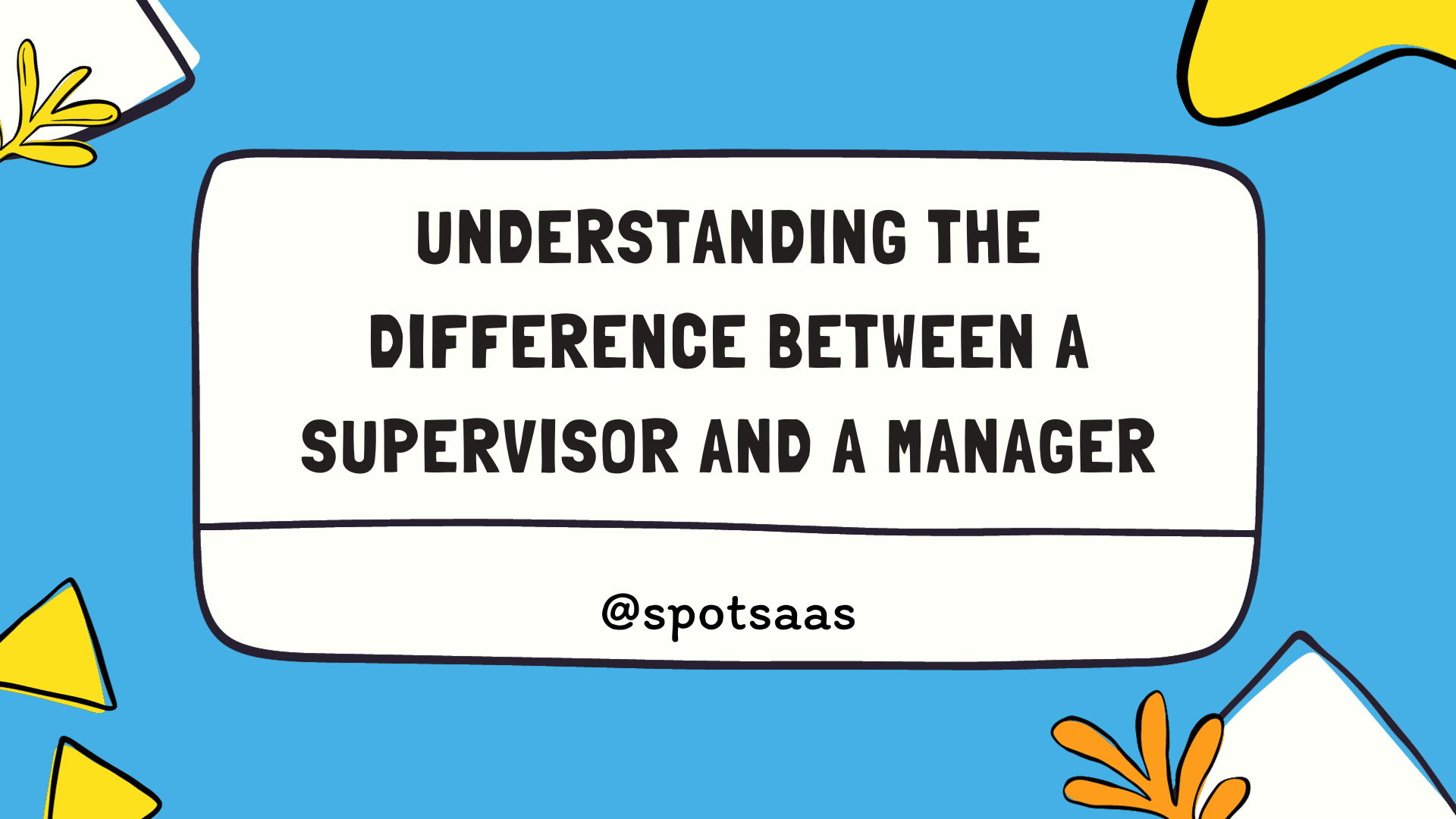Ever wondered what separates a Supervisor from a manager? You’re not alone – it’s a common question in the work world.
I’ve been both, so I can help clear things up. In this article, we’ll break down what each role does, the skills they need, and why understanding the difference can help your career. Let’s dive in!
Key Takeaways
- Managers have a strategic role and focus on external factors, while the latter concentrate on internal tasks and operations.
- Managers have higher authority levels and are responsible for setting goals, making decisions, and leading multiple teams or divisions.
- Supervisors oversee day-to-day tasks, ensure work is completed effectively, and contribute to employee development.
- Managers are leaders with a strategic role, while the latter focus on implementing tasks internally.
- Managers make decisions based on their position in the company hierarchy, while supervisors oversee daily operations within their teams.
- The roles of managers and supervisors differ in terms of authority level and responsibilities.
Definition and Roles of a Manager and Supervisor
A manager is a leader who plays a strategic role in an organization and has an external focus, while the latter focuses internally on implementing tasks and ensuring day-to-day operations run smoothly.
Manager: strategic role and external focus
As a manager, the strategic role involves planning, decision-making, and goal-setting. This position is higher in an organization’s hierarchy and often requires leading multiple teams or whole divisions.
The focus extends beyond internal operations to include external factors like market trends, competitor movements, and industry changes. Managers hold formal authority based on their role within the company structure.
With this authority comes increased responsibilities for the overall performance and results of their assigned sectors. Effective managers need critical skills such as leadership abilities, astute decision-making prowess, and strategic thinking capabilities to successfully navigate these duties.
Supervisor: internal focus and implementation
A supervisor is a vital part of an organization. They concentrate on the internal focus and implementation of tasks within their team. Strong organizational skills are a must for meeting deadlines, ensuring quality work, and keeping the team synchronized.
It’s the role of the supervisor to oversee day-to-day tasks and make sure that each team member is efficiently contributing towards organizational goals.
In addition to this, supervisors carry out employee development initiatives to strengthen their teams’ performance. This involves monitoring techniques and processes employees use in completing tasks, providing constructive feedback, or offering training opportunities as required.
Supervisors not only ensure proper task execution but also contribute significantly to maintaining harmony within their teams by resolving interpersonal issues promptly.
Differences Between Managers and Supervisors
Managers have higher authority levels and are responsible for strategic planning, while supervisors focus on day-to-day implementation and have limited decision-making authority.
Authority level
Managers hold a higher authority level in an organization’s hierarchy compared to supervisors. They bear the responsibility of making strategic decisions and setting goals for the entire team if not multiple teams or divisions.
On the other hand, supervisors largely handle tactical functions such as monitoring techniques, enforcing standards, and ensuring the timely completion of tasks. The position-based formal authority gives both these roles the power to manage personnel within their respective domains.
Responsibilities
As a supervisor, my responsibilities primarily revolve around overseeing the day-to-day tasks of my team and ensuring that they are performed effectively. I am responsible for providing guidance, support, and feedback to my team members, as well as monitoring their performance and addressing any issues that arise.
Additionally, I am in charge of implementing company policies and procedures within my team and maintaining productivity levels. It is crucial for me to prioritize communication and keep an open line with both my superiors and subordinates to ensure smooth operations within the team.
Ultimately, my goal is to achieve the desired outcomes while fostering a positive work environment where everyone can thrive.
Objectives
The objectives of managers and supervisors differ based on their roles within the organization. Managers have strategic objectives that focus on overall planning, decision-making, and goal-setting for the company or division they oversee.
Their main objective is to ensure the long-term success and performance of their teams or departments. On the other hand, supervisors have more operational objectives that involve overseeing day-to-day tasks, and ensuring work gets done according to standards and timelines set by the company.
They focus on managing team members’ performance and effectiveness in achieving specific goals. While managers are responsible for the outcomes and results achieved by their teams, supervisors are focused on monitoring techniques and processes used by employees to complete tasks successfully.
In summary, while managers have strategic objectives related to long-term planning and departmental success, supervisors have operational objectives centred around task management and employee performance.
Salary
Managers and supervisors may also differ in terms of their salary. As managers hold higher positions in the organizational hierarchy, they often earn more than supervisors. This difference in pay reflects the increased responsibility that managers have for the overall performance and success of their teams or divisions.
On the other hand, while supervisors are responsible for overseeing a single team’s day-to-day tasks and ensuring that work is completed according to standards, their salaries tend to be lower than those of managers due to their narrower scope of responsibilities.
Ultimately, the salary disparity between managers and supervisors reflects the varying levels of authority and accountability associated with each role within an organization.
Skills Required for Managers and Supervisors
Managers and supervisors need strong communication, leadership, time management, delegation, and problem-solving skills to effectively carry out their roles. Read on to learn more about these essential skills and how they contribute to success in the workplace.
Communication
Effective communication is a crucial skill for both managers and supervisors. As a manager, I need to communicate my vision, goals, and expectations clearly to my team members. This ensures that everyone understands their roles and responsibilities.
Regular communication helps me keep track of progress, provide feedback, and address any challenges or concerns that arise. As a supervisor, clear communication is essential in conveying instructions and ensuring that tasks are understood and completed on time.
It also enables me to provide guidance and support to my team members when needed. Good communication fosters teamwork, promotes collaboration, and enhances overall performance within the organization’s hierarchy.
Leadership
Effective leadership is a crucial aspect of both managerial and supervisory roles. As a leader, it is essential to inspire and guide your team towards achieving organizational goals.
Managers must demonstrate strategic thinking, decision-making abilities, and the capacity to lead multiple teams or divisions. They set the overall vision for the company and make key decisions that impact its success.
Supervisors, on the other hand, focus on leading their team members in day-to-day tasks and ensuring their performance meets established standards. Good leaders possess strong organizational and interpersonal skills to effectively manage their teams while promoting employee development and maintaining high levels of performance.
Time management
Managing time effectively is an essential skill for both managers and supervisors. As a manager or supervisor, I must prioritize tasks, set deadlines, and ensure that my team stays on track to meet goals and objectives.
By utilizing effective time management strategies, such as creating schedules, delegating tasks appropriately, and setting realistic timelines, I can optimize productivity within my team.
This allows me to efficiently allocate resources and maximize efficiency in day-to-day operations. Ultimately, strong time management skills contribute to the overall success of the team or division I oversee.
Delegation
Delegation is a crucial skill for both. As a manager or supervisor, it’s important to be able to effectively assign tasks and responsibilities to your team members.
By delegating tasks, you not only free up your own time but also allow your team members to develop new skills and take on more responsibility. Delegation also helps to increase productivity within the team by ensuring that work is distributed evenly and completed in a timely manner.
Effective delegation requires clear communication, trust in your team members’ abilities, and the willingness to provide guidance and support when needed.
Problem-solving
Problem-solving is a crucial skill for both. As a manager or supervisor, I need to be able to identify and analyze problems that arise in my team or department and come up with effective solutions.
This involves evaluating different options, considering the potential consequences of each choice, and making decisions that will resolve the issue at hand. By utilizing problem-solving skills, I can ensure that obstacles are addressed promptly and efficiently, allowing my team to work towards their goals with minimal disruptions.
Advancing from Supervisor to Manager and Development Training Opportunities
| Aspect | Importance | Leadership development focuses on effective communication, team-building strategies, conflict-resolution tactics, and essential leadership qualities. |
|---|---|---|
| Strategic Thinking and Decision Making | Crucial for long-term planning and aligning actions with organizational objectives. | Training provides practical exercises, case studies, and mentorship opportunities for enhancing strategic decision-making skills. |
| Leadership Abilities | Essential for motivating teams, resolving conflicts, and fostering collaboration. | Leadership development focuses on effective communication, team-building strategies, conflict-resolution tactics, and essential leadership qualities. |
| Organizational Processes | Important for managing time, delegating tasks, and ensuring team productivity. | Training emphasizes practical tips and tools for task prioritization, efficient management, and team productivity enhancement. |
Conclusion
In conclusion, understanding the difference between a supervisor and a manager is crucial in recognizing the distinct roles and responsibilities each position carries. While managers focus on strategic planning, decision-making, and overall goal-setting, supervisors play a vital role in ensuring that day-to-day tasks are completed efficiently and according to company standards.
By understanding these differences, organizations can effectively utilize both positions to drive success and productivity.
FAQs
1. What is the main difference between a supervisor and a manager?
A supervisor is responsible for overseeing the work of a group of employees, while a manager has broader responsibilities that include planning, decision-making, and setting goals.
2. Can a supervisor also be a manager?
Yes, in some cases, a supervisor can also hold the position of a manager if they have additional responsibilities beyond supervising employees.
3. What skills are important for being an effective supervisor?
Important skills for being an effective supervisor include good communication, leadership abilities, problem-solving capabilities, and the ability to motivate and support team members.
4. What are the typical duties of a manager?
Typical duties of managers include organizing and coordinating resources, making strategic decisions, setting goals and objectives for their department or team, managing budgets and finances, and ensuring overall productivity.
5. How do supervisors and managers contribute to organizational success?
Supervisors contribute to organizational success by ensuring smooth day-to-day operations and efficient performance of their team. Managers contribute by providing direction for the organization as well as long-term planning to achieve company goals.




